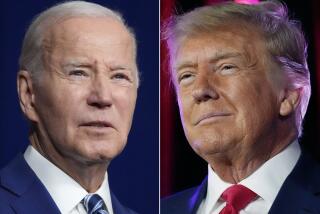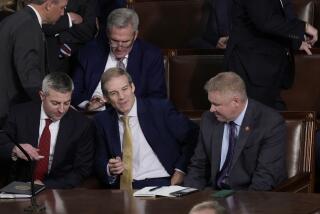Islamists Face Likely Defeat in Jordan Vote : Mideast: Muslim fundamentalist candidates for Parliament temper rhetoric. New electoral law and their failure to deliver put gains in peril.
- Share via
SALT, Jordan — Dressed in a pin-striped suit, beneath pink and white wedding banners in this ancient town, Abdel Latif Arabiyat hardly looked the part of Jordan’s leading Islamic fundamentalist candidate in today’s crucial national elections. He didn’t sound much like it either.
As the former Speaker of the Islamic-led lower house of Parliament appealed to an unlikely group of voters--300 women packed into the Al Noor Wedding Hall here--at the peak of last week’s campaign for Jordan’s 80-seat Council of Deputies, there was no hint of the firebrand religious rhetoric of Islam that filled the legislature in its years of challenges to the secular policies of King Hussein.
When they go to the polls in what promises to be a watershed test of political Islam, Arabiyat told the women of Salt, they should remember only that “the Prophet Mohammed says women and men are synonyms.”
There was a broader message in Arabiyat’s moderate new tone, which reflected the powerful change that most political analysts here expect from the 1.5 million registered Jordanian and Palestinian voters when the winners are announced Tuesday.
Four years ago, Jordan sent shock waves through secular regimes in the Middle East and the Arab world, and ripples of concern as far away as Europe and the United States, when its first experiment in democracy elected a fundamentalist-controlled Parliament. Now, it is poised to deliver the Islamic movement its first democratic reversal.
“This could be the shortest political era in our history,” said Mustafa Hamarneh, a Jordan University political science professor and head of the Center for Strategic Studies. He predicted that the Islamists could lose more than half the seats they won in 1989.
George Hawatmeh, editor of the English-language newspaper Jordan Times, which has microanalyzed each of the 80 contests and profiled most of the 550 candidates, said, “I expect the Islamists to be much weakened.”
But the reasons are not as simple as the expected result, which appeared so obvious even to the Islamist leadership that candidates like Arabiyat took pains to temper their politics and ideology in the past 10 days of campaigning.
Jordanian society remains largely tribal and feudal, and the politics of clan and the patronage of jobs still take precedence for voters over the politics of Islam in an election pitting fundamentalists against tribal chiefs against Communists against royalists.
There is also a fundamental change in Jordan’s election law. The new rules governing today’s balloting were decreed last month by King Hussein, who, analysts say, targeted Jordan’s Muslim Brotherhood and its political party, the Islamic Action Front. Several Islamists further asserted that the king passed the new law partly to allay fears in the Clinton Administration of a deeper fundamentalist entrenchment in Jordan at a time when this nation must play a critical role in the Middle East peace process.
The secular monarch, deeply committed to a gradual transition from decades of his unchallenged rule to a Jordanian-style representative democracy, has denied the charge.
But he was forced to confront the former Parliament in the four stormy years in which it tried to enact measures such as those to separate boys and girls in public schools and to implement strict Islamic law in the kingdom. At one point last year, the king jailed two Islamist deputies, who were tried, convicted and sentenced--though later pardoned by the king--on charges that they conspired with Iran’s fundamentalist regime to overthrow him.
The king has insisted that the new electoral law is a step closer to democracy. It legalizes political parties and, more important, establishes for the first time a “one person, one vote” system, which effectively closes the political loophole that the well-organized Islamists used to take legislative power in 1989.
Under the old law, voters could cast ballots for more than one candidate in each of Jordan’s 20 districts. In most cases, voters first selected a member of their own clan. Their second vote went to independent “service” candidates who could deliver water, roads or jobs. Only then came ideology; their final votes went to Islamist candidates, who together won the largest single bloc of 22 seats and forged the ruling coalition with independents, whom the Islamists backed in the election.
The most concrete indication of how voters plan to cast their single vote came in a poll that Hamarneh’s center conducted nationwide earlier this year. When asked their top priority in this year’s elections, the majority listed “social and other services that would be secured by candidates.”
And more than half polled said they felt the previous Parliament failed to maintain contact with the electorate or to address “citizens’ urgent demands and problems.”
“The biggest problem most people see with the Islamists in the last Parliament is . . . they did absolutely nothing,” the Jordan Times’ Hawatmeh said. “They had no program. They won big in 1989 because they had the organization, the money and the promise of change. They ran on a program of fighting corruption and liberating Palestine. The voters thought, ‘Let’s give these people a chance,’ and then they discovered that their impact was nil.”
But liberating Palestine, he and other analysts added, clearly is an issue that remains at the top of the agenda for many voters--the hundreds of thousands of Palestinians who are registered and who have widely differing views on how to restore their Israeli-occupied homeland next door.
But for the Palestinians, unlike Jordanian-born Bedouin clans and tribes, it is the recent peace accord between Israel and the Palestine Liberation Organization that has been the campaign’s critical factor--so crucial that King Hussein considered postponing the election, fearing that polarization in Jordan’s Palestinian community in the aftermath of the accord would skew the outcome against Jordanian-born voters.
He relented. But it was clear throughout the campaign that deep divisions in the Palestinian community in the Israeli-occupied territories will be reflected in the Jordanian vote, which already has aroused unprecedented Palestinian participation.
In Salt’s Balqa district, for example, the nation’s largest Palestinian refugee camp is fielding two candidates for the first time. One is backed by PLO Chairman Yasser Arafat’s Fatah faction; the other is backed by fundamentalist Hamas, which rejects the historic Israeli-PLO plan for limited Palestinian autonomy beginning in Jericho and the Gaza Strip. Unlike in the occupied territories, though, where the two factions have come to blows, both candidates are expected to win seats and to serve side by side in the next Parliament.
Salt, which is about 15 miles northwest of the capital, Amman, is a bellwether in other respects. It offers what analysts said are prototypes of the likely personality of Jordan’s next Parliament, a far more secular body that will be more loyal to King Hussein and more willing to ratify a future peace treaty between Jordan and Israel.
Jordanians Going to Polls
Some facts about Jordan’s parliamentary elections today, the first multi-party voting in the kingdom since 1956:
* System--One person, one vote elections are for the 80-seat Council of Deputies, the lower house of Parliament. A 40-seat upper chamber is appointed by King Hussein.
* Voters--About 1.5 million Jordanians are eligible to vote out of a population of 3.9 million.
* Political Groups--Hussein lifted a 1957 ban on political parties in September, 1992, and 22 parties are now legal.
* Candidates--There are 550, including three women. Nine seats are allotted to Christians, three to other minorities, remainder to Muslims.
* Issues--Fundamentalists vehemently oppose peace with Israel. Voters’ main concern, however, is with the economy.
More to Read
Sign up for Essential California
The most important California stories and recommendations in your inbox every morning.
You may occasionally receive promotional content from the Los Angeles Times.










